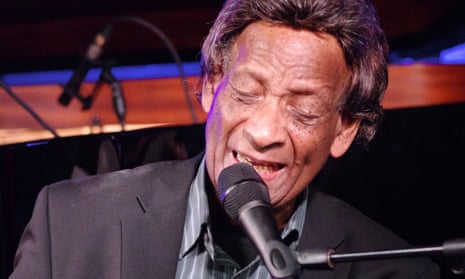Frank Holder, who has died aged 92, forged a lengthy career on the London jazz scene that encompassed everything from singing with big-name bands to solo appearances on cabaret and supper club circuits. Along the way he taught himself to play the conga drums and bongos, adding his percussive skills to jazz rhythm sections and later functioning as a kind of one-man variety act, incorporating a few dance steps and always singing with sensitivity and gusto.
From 1950 he sang with the Johnny Dankworth Seven, played percussion for Joe Harriott, gave a young Cleo Laine tips in stagecraft and shared tours with Nat King Cole and Billy Eckstine. In his later career there were associations with the top Latin group Paz, and with Pete Long’s Gillespiana, a big band that recreated Dizzy Gillespie’s music, plus a series of fine albums on the Mainstem label, his accompanists all top contemporary jazz musicians. Frank performed in venues small and large, for ever on the go until very recently.
He was born in Georgetown, British Guiana (now Guyana). His father, Cyril Holder, was a motor mechanic and dance promoter, his mother, Ursula (nee Capadoza), a housewife who raised their six children. His parents were church people, with young Frank encouraged to sing at church socials. Listening to late-night Voice of America radio broadcasts introduced him to jazz, and Frank pleaded with visiting bands to let him sing, telling me that “their arms were twisted as Dad paid the band”.
In 1944 he volunteered for the RAF, determined “to help save the mother country”, and travelled over on a troopship, part of a massive convoy. “It was a hairy crossing. U-boats everywhere,” he remembered. Steeped in all things British, Frank found that he knew more about “your kings and queens” than his fellow RAF recruits. He sang with all the service bands he could before persuading the great West Indian trumpeter Leslie “Jiver” Hutchinson to sign him as a band singer in 1948. “He obliged me by doing that and I got demobbed here,” Frank said. “He gave me my break.”
After touring with Hutchinson, Frank worked in London with Latin bands for the next couple of years until he was approached by Dankworth in Archer Street, the jazz world’s open-air labour exchange, and was offered the job of singer with the newly formed Seven. Already a habitué of the modern jazz hangout the Club Eleven, Frank was, he said himself, “well into bebop and when it came to my turn I could improvise. Really I wanted to be like an instrument.”
From 1950 he was an integral part of the Seven’s success, recording for the Esquire label, and was on hand to help audition Laine when she joined the Seven. Laine gladly acknowledged Frank’s advice and support during her early career. Dankworth noted Frank’s “great stage presence and tremendous energy. He was a show-stopper on the bongos and the conga drum.”
Frank stayed on briefly when Dankworth formed his first big band, often on call for Dankworth’s other concert ventures, before leaving to collaborate with Latin American groups then active in London and to play percussion on tour with jazz stars such as Tubby Hayes and Ronnie Scott.
He recorded with Kenny Graham’s Afro-Cubists as a percussionist in 1957 and made a calypso album for the Pye record label before another momentous opportunity came his way. The brilliant Jamaican alto saxophonist Joe Harriott recruited him for his highly innovative jazz quintet, playing European club dates and on recordings, most notably a version of Caravan that allowed Frank to display his exceptional percussive talents.
In the late 1950s, after the Harriott band ran out of work, Frank reinvented himself as an entertainer, saying: “I wanted to be more than a jazz singer. I wanted to entertain, lift people out of their seats.” And entertain he did, singing, tap-dancing, drumming, doing the splits and touring the nation’s variety halls, later taking in the Mecca and Empire circuits, plus hotel, cabaret and cruise jobs.
In the 90s, David Hays of Mainstem records released three albums by Frank: The Artistry of Frank Holder, accompanied by Duncan Lamont; I Love Being Here With You; and Ballads, Blues & Bop. Following his time with Paz and the Gillespiana gigs he continued to perform up until the week before he died.
Frank had met Irene Cox, a Selfridges sales assistant, at a Dankworth gig, and they married in 1963. She was his champion and a vital element in his success.
He is survived by Irene, by his children, Frank Jr, Lisa and Desiree, and by seven grandchildren and two great-grandchildren.

Comments (…)
Sign in or create your Guardian account to join the discussion